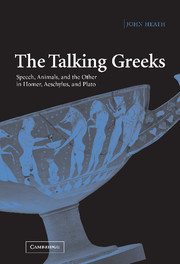Book contents
- Frontmatter
- Contents
- Preface and acknowledgments
- Introduction
- Part I SPEECH, ANIMALS, AND HUMAN STATUS IN HOMER
- Part II LISTENING FOR THE OTHER IN CLASSICAL GREECE
- Part III SPEECH, ANIMALS, AND HUMAN STATUS IN CLASSICAL ATHENS
- Chapter 5 Disentangling the beast: Humans and other animals in the Oresteia
- Chapter 6 Socratic silence: The shame of the Athenians
- Epilogue
- Bibliography
- Index
Chapter 6 - Socratic silence: The shame of the Athenians
Published online by Cambridge University Press: 22 September 2009
- Frontmatter
- Contents
- Preface and acknowledgments
- Introduction
- Part I SPEECH, ANIMALS, AND HUMAN STATUS IN HOMER
- Part II LISTENING FOR THE OTHER IN CLASSICAL GREECE
- Part III SPEECH, ANIMALS, AND HUMAN STATUS IN CLASSICAL ATHENS
- Chapter 5 Disentangling the beast: Humans and other animals in the Oresteia
- Chapter 6 Socratic silence: The shame of the Athenians
- Epilogue
- Bibliography
- Index
Summary
Aeschylus' hope that the polis could keep the beast in place was, of course, doomed. The great Athenian writers after him, confronted with challenges to the city from outside its walls, increasingly found that the creature within presented the greater danger. Authors on all sides of the intellectual and political controversies of the day could agree that the animal in human nature was out of the cage and unlikely to be enticed back in. Sophocles' riddle-solving Oedipus, an apparent master of language, discovers that the rational control of his destiny is an illusion. His heroic and horrifying search for himself finally leads to a blinding vision of our human limitations. The wasps, frogs, and birds of Aristophanes' fantastic choruses recite – and croak – both direct and indirect commentaries on the attitudes and politics of war-torn Athens. Thucydides tells us that the internecine bloodbath in Corcyra led to such savage revolutions throughout Greece that language itself, our most human attribute, became fluid and the ordinary meanings of words changed as men tried to justify their butchery (3.82.4f.). Euripidean characters like Medea, Hippolytus, Heracles, and Hecuba abuse logos and lose their humanity before our eyes, becoming gods or beasts – or both. The hyper-rationality of the repressed Pentheus in the Bacchae ultimately leads to civic disruption and a bestial death. Dressed as a bacchant, wearing animal skins, the king becomes the feral prey of the women of Thebes, now symbolically metamorphosed through their madness into hunting dogs.
- Type
- Chapter
- Information
- The Talking GreeksSpeech, Animals, and the Other in Homer, Aeschylus, and Plato, pp. 259 - 314Publisher: Cambridge University PressPrint publication year: 2005



